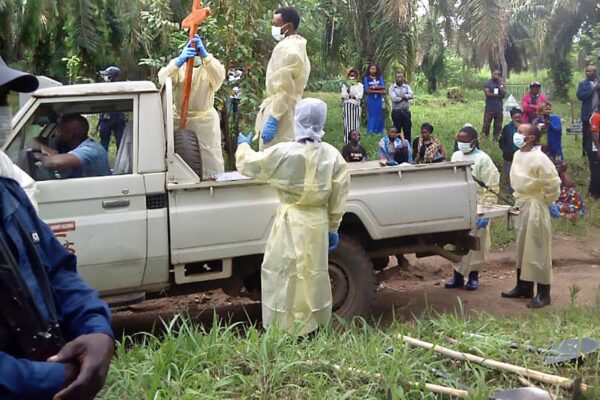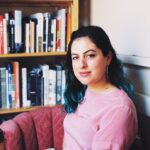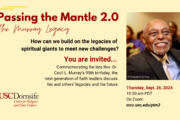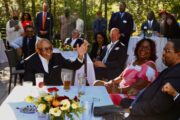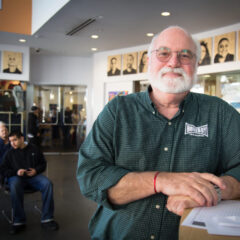This radio documentary was originally produced by KALW’s The Spiritual Edge, with the support of CRCC’s global project on engaged spirituality.
To hear this and other profiles, subscribe to The Spiritual Edge podcast in your favorite podcasting app, including Apple podcasts, Spotify or Google Podcasts. Find out more on The Spiritual Edge website.
The car Noe Kasali drove was covered in orange dust when he arrived in the small town of Mangina, about an hour’s drive from his home, down a bumpy dirt road. It was a hot day in late summer. “We did not have any PPE with us. We came just wearing simple, simple clothes,” he said.
Noe and two of his colleagues got out of his car and walked toward a brick church with a metal roof. Dozens of people sat outside, waiting. Noe approached them but didn’t get too close. The same public health guidelines that restricted funeral attendance stopped him from making physical contact. Instead of shaking people’s hands, he looked each person in the eye and said, “Poli poli. We are together. And we are sorry for what happened. Poli poli poli poli.. [We are] just so sorry. Sorry. Sorry.”
In Swahili, Noe introduced himself and his colleagues as mental health counselors from a nearby town. People raised their hands to speak. Noe called on a short woman, sitting by herself, Katoomba Kenyatole. Within three months, Ebola had killed her mother, grandmother, five siblings, four aunts and two cousins. Kenyatole told Noe that her remaining family had warned her not to trust him. They said people like Noe were bringing the sickness to them, “and that nobody from our family should attend this kind of gathering.” Noe recalled. “The Ebola people,” Kenyatole told him, “are the ones who are responsible for the death.”
The Ebola people. Doctors. Nurses. Red Cross workers. Burial team volunteers who disposed of infected bodies. And people like Noe, who hoped to heal the spirits of those who survived. This was in August, 2018. The virus had surfaced in the town of Mangina as the tenth and largest Ebola outbreak in the DRC.
Months earlier, Noe hadn’t imagined he’d be working on the front lines of the epidemic. He was in his mid-thirties, pursuing his dream of operating a mental health clinic in his hometown — a city called Beni about an hour’s drive east of Mangina. After work, he’d spend his evenings laughing with his wife and singing with his daughters. “My first and ultimate role,” he said, “is to be a good husband to my wife and to be a good father to my children.” So when newspapers, TV and radio stations started warning about Ebola, Noe worried first about his family.
The more he watched the news, the worse matters appeared. It seemed that people weren’t following public health guidelines at all. And when Red Cross workers tried to help, Noe said, many people were angry. So angry that young people would attack health workers in the streets. “Youth would stand along the road and yell at them and throw stones and hit them,” Noe said. “A lot of them would get injured while they are doing this precious work of going to bury people safely.”
Some locals believed that people who volunteered to bury Ebola victims had really arrived to kidnap them. “It is terrible,” Noe said, “because I know how many people died in my country and that they would not have…if these messages were not part of the story of public health.”
He compared the first six months of the Ebola response to a war, a phenomenon he knew first-hand.
Before Ebola, Noe’s country had endured a lot. Harsh colonial rule, abductions that forced people into slavery a wide ocean away, political corruption and violence, forced labor in gold mines and rubber plantations. The disruption continued after 1960 when Congo became independent from Belgium.
“The country was already very shaky and very fragile,” Noe said.
That fragility directly affected Noe and his large, loving family. When Noe was 16 years old, in 1996, a massive civil war broke out. The fate of people he loved during that time eventually led to his work with Ebola survivors.
When Noe was younger, his father, Ye-Ye Kasali, was a well-known Christian pastor. Noe described his father’s work as “a ministry of love.
“He was really that person who brings people together from different tribes,” Noe said. He was a bridge builder, who preached even to people who didn’t share his faith.
One afternoon after gardening, Noe’s dad collapsed. The following day the teen was keeping vigil by his coffin. “I was angry against doctors,” Noe said, adding that he believed “they may have made him die somehow. And I was angry against the world.”
He didn’t have much time to dwell on his pain. Within months, news broke that armed militias — fighting to overtake the president, and leaving hundreds of thousands dead and widespread destruction in their wake — were heading into Noe’s town. He left school. Everywhere, he saw people running. His siblings told him to hurry up and pack. “One shoes, one pants, whatever you have put in your small bag, be ready,” Noe recalled them saying. “We are leaving right now.”
Noe, his mother, his siblings and their partners headed into the pitch-black woods.
They walked for two days until they stopped on a plot of land and built a shelter from whatever they could find.
Noe didn’t know how long they’d have to keep hiding, or whether they’d make it out alive. His sister didn’t. She died on Christmas Day, 1996. She was in her thirties. “During that time, nobody was even available to come and comfort us as we were burying our sister,” Noe said. “That was terrible.”
Finally, his family got word that their home town was safe again. A year after that, he was back in school. “My grades were very poor,” Noe said. “I was a broken boy.”
Somehow, he finished high school and enrolled in a university near his home. When it came time to choose an area of study, he thought about his scattered family — the people he loved and what they’d endured. He wanted a profession that could help people. So he chose psychology.
He did well, graduated, married the love of his life, and had his first daughter. A friend told him about Wheaton College, an evangelical school in the United States. There, he could continue studying psychology through a Christian lens. He applied and won a full scholarship to a graduate program.
In August 2013 he got on a plane to Chicago with his wife and their toddler. He settled in and started classes in counseling and psychology. All the students in his field had to be in therapy. When his therapist realized that Noe hadn’t grieved his dad, he asked if he would like to. He then led Noe through “a powerful grief journey” in his office, using “the empty chair technique.”
Noe faced an empty chair in the middle of the room, as if it was his dad.
“I went back to being a young boy,” Noe said. “I said, ‘Dad, How am I going to go through this life without you?’
“There was something that was kind of moved out of me, like a weight that has been removed out of my shoulders.”
In two years, Noe earned a degree. Then, he started packing. When his friends and family back home heard he was planning to return, they asked, “You are coming back here? You are coming to this place that is on fire? Don’t come. You stay there.”
At that time, in 2015, the United Nations called his home region, North Kivu, one of the most volatile provinces, with armed groups that had a history of sporadic but serious outbreaks of violence and terror. Noe did think twice about moving from the U.S. to the DRC. “It’s unsafe,” he remembered saying. “And how can we go as a family? Now I’m a father.”
But he resolved to act upon the lyrics of a religious song he knew:
“If you can use anything, well, you can use me…Take my hands, Lord and my feet. That’s my heart. Lord. Speak through me. If you can use anything, Lord you, can you use me.”
Noe and his family packed their bags and flew home.
Beyond a Christmas reunion with his family in DRC, Noe focused on his goal: starting a mental health clinic. He opened the Bethesda Counseling Center in Beni, with four staff members a year after his return. They didn’t charge their patients.
“As soon as people discovered our approach, our work, our services, Whoa,” Noe recalled. “The office was packed.”
People walked, drove, and rode their bikes from towns nearby. They stood in line for hours to get treatment from Noe and his team of mental health professionals. Mostly, the team saw people who had experienced domestic violence, depression and nightmares. Sometimes, Noe felt helpless.
Two years after his clinic opened, Ebola surfaced in the town. Its symptoms include vomiting, diarrhea and bleeding. Among infected people, the fatality rate ranged from 60 to 90 percent.
“And I was there again with my family.” Noe said.
He heard rumors that Ebola was a hoax. Mangina reported the most deaths. The survivors there, Noe said, were portrayed as aggressive people. Based on what he’d learned, he identified that aggression as “a trauma response. These people need to grieve.”
To help them, he’d have to be in Mangina, the epicenter of the virus. At this point, his family included three daughters; the eldest was five years old. His wife asked him why he had to keep making dangerous decisions.
As he made up his mind, Noe turned to God. “If there is one thing that my relationship with God teaches me, it is compassion.” he said. “It makes me ready to serve in such a difficult time as Ebola.”
Noe decided to evacuate his family to Uganda. Ebola wasn’t really a problem there, so he planned to stay with his family for a while. Then, every few days, he’d return to Mangina to help people grieve.
When he got to the town, Noe found that many people were in denial and angry. A big element of their grief, he said, was that people couldn’t attend their loved ones’ burials. “You cannot even come close to the body because of how infectious the body is,” he said.
In normal times one of the major ethnic groups in North Kivu, the Nande, would wash the dead body and clothe it with new clothes. People would come to touch and smell the body, to sing and dance around it, to cry.
“The sense of showing up is very important. Without any invitation, people come and come and come and come and come,” Noe said. “And all the sudden you see a huge community of people gathering around the grieving family.”
During Ebola, trained burial volunteers wearing protective gear picked up bodies to safely bury them — often, in unmarked plots.
The absence of ritual, Noe realized, detached people from their loss and left them “kind of questioning — if it happened or not.”
He’d felt that way. “I really remembered my sister,” Noe said. “And then I knew exactly what we lacked there.”
What he and his staff could do for the living was somehow recreate the rituals that people lost and help them grieve. That, Noe supposed, might help them work through their denial and anger and ultimately change their responses to Ebola workers, and to the disease.
Noe remembered an email a colleague had sent over a Wheaton alumni listserv. It contained a link to a technique called a goodbye letter that grieving people could write to the people they’d lost.
Noe sensed it was similar to the empty chair exercise his therapist had walked him through in graduate school. The letter would help people say “good bye.” Noe translated and printed the letter. On it was a space to write the name of the person who died. “It was a breakthrough when I found that tool,” he said.
With public health as a top priority, the letter exercise became part of a grieving program Noe developed with his team for the town of Mangina. During group sessions, survivors shared stories about their deceased relatives. They brought photos, prayers, music that could help fill in for what they’d traditionally done at burials. “They’ll say, ‘My loved one was a carpenter. ‘Another will say ‘He was a farmer,’” Noe said.
One woman wrote a letter to her mother. When she read it out loud in front of a dozen people, she held a flower she had picked outside. “[She] started to say her words while she was touching that flower and it was so much tears but the flower fell off her hand,” Noe recalled. “She went down on the floor and put her hands on the flower. That’s the part that really, really touched me.”
The last step in Noe’s program replicated a Nande graveside ritual called Mahima Mojarro. In it, people would cover the grave with seeds. Three or four months later when they returned to visit the gravesite, there would be flowers growing.
Many Ebola survivors couldn’t identify where their relatives were buried. So Noe’s team told families to choose a tree and a special place to plant it. Some requested fruit trees, he said, because one day they could eat the fruit from that tree. Others decided on trees that provided a lot of shade to sit under.
Katoomba Kenyatole — the woman who had challenged Noe’s presence in her town — used to sell fresh fruit with her mother. She chose a tree that produces bright red fruit resembling avocados.
People have planted more than 100 trees around the Beni area in memory of loved ones who died from Ebola. “The last time I was in Mangina, looking at all the trees that were planted,” Noe said, “I really felt the sense of like, ‘Yes, there’s hope, but also this sense of…then what, then what?’”
After a pandemic such as COVID, he said, “we’re going to face another crisis even larger than what we have already seen.”
Beyond these diseases, Noe knows his country has plenty else to heal from. But his father’s legacy and his own faith fuel him to continue serving people in the DRC.
Click here to listen on The Spiritual Edge.
Shaina Shealy is a journalist fellow with the Spiritual Exemplars Project.
